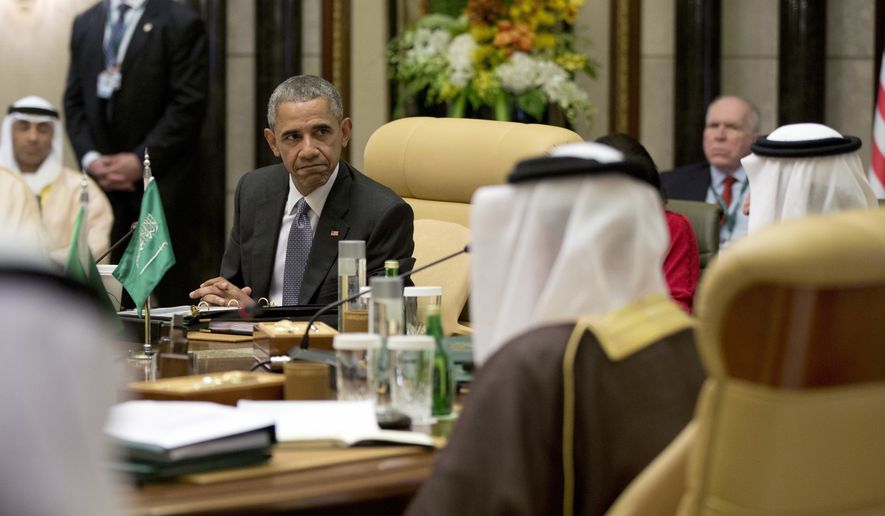President Obama on Thursday reaffirmed support for U.S.-allied Arab nations after a meeting with regional leaders in Saudi Arabia, speaking about the fight against the Islamic State terrorist group while acknowledging “serious concerns” about Iran’s behavior.
Mr. Obama said he reaffirmed the policy of the United States “to use all elements of our power to secure our core interests in the Gulf region and to deter and confront external aggression against our allies and our partners.”
“We remain united in our fight to destroy ISIL, or Daesh, which is a threat to all of us,” Mr. Obama said, referring to the Islamic State terrorist group. “The United States will help our GCC partners ensure that their special operations forces are interoperable and GCC nations will continue to increase their contributions to the fight against ISIL and the coalition that [we] formed.”
Besides Saudi Arabia, the Gulf Cooperation Council (GCC) includes the United Arab Emirates, Qatar, Kuwait, Oman and Bahrain. Mr. Obama delivered the statement from Saudi Arabia, where he was meeting with leaders from the countries.
Speaking to reporters later, Mr. Obama was asked about recent strains in the relationship between the United States and Saudi Arabia.
Mr. Obama pointed out that GCC countries have partnered with the United States on counter-terrorism, are part of the coalition fighting the Islamic State, and said the Iranian nuclear deal would not have happened without GCC support.
SEE ALSO: Push for answers on Saudi Arabia’s involvement in Sept. 11
“So what is true between the United States and the GCC, as is true with all of our allies and friends, is that at any point in time, there are going to be differences in tactics,” he said.
Mr. Obama acknowledged that “mistrust” has built up in part because of Iranian “provocations.”
“People are cautious, and want to make sure that nobody’s naive about what Iran” may be doing, he said.
Mr. Obama pointed out that during the height of the Cold War, Democratic and Republican presidents still negotiated with the Soviet Union even amid threats of the destruction of the United States.
“That’s the same approach that we have to take,” he said. “Even as Iran is calling us ’the great Satan,’ we were able to get a deal done where they got rid of their nuclear stockpiles, and that makes us safer.”
“That’s not a sign of weakness — that’s a sign of strength,” he said.
The president’s trip to the country came amid tensions over Saudi Arabia’s possible role in the Sept. 11 terrorist attacks. The Saudis are reportedly threatening to sell off $750 billion in U.S. assets if a Senate bill allowing victims of terrorism to sue foreign countries becomes law. The White House has threatened to veto the bill.
Mr. Obama also recently told the Atlantic Magazine, for example, that regional allies like Saudi Arabia need to find an effective way to “share the neighborhood” with Iran.
Earlier, toward the end of the meeting with the foreign leaders, Mr. Obama also talked about continuing support for Iraq as it liberates and stabilizes towns and cities from Islamic State control, and pledged to continue humanitarian aid to the people of Syria and Iraq.
Even with the Iranian nuclear deal, Mr. Obama also said that “we recognized, collectively, that we continue to have serious concerns about Iranian behavior.”
“Our nations committed to continue to interdict illegal Iranian arms shipments, impose costs on Iran for its ballistic missile program and oppose Iran’s destabilizing activities in the region,” he said.
He also said that “we welcome an Iran that plays a responsible role in the region — one that takes concrete, practical steps to build trust and resolve its differences with its neighbors by peaceful means and abides by international rules and norms.”
Mr. Obama also spoke about de-escalating and resolving regional conflicts, saying a cessation of hostilities in Syria “is obviously under tremendous strain, including continued violations by the Assad regime.”
Mr. Obama also talked about the cessation of hostilities in Yemen so humanitarian aid can be brought to the Yemeni people.
“With regard to Libya, we agreed to keep building support for the new national unity government,” he said.
Mr. Obama said the United States would also continue to increase its security cooperation with GCC countries.
In a meeting with King Salman of Saudi Arabia Wednesday, Mr. Obama “underscored the importance of accelerating the campaign” against the Islamic State terrorist group and “welcomed Saudi Arabia’s important role in the coalition,” according to a readout from the White House.
The two also discussed “the challenges posed by Iran’s provocative activities in the region, agreeing on the importance of an inclusive approach to de-escalating regional conflicts,” the White House said.
Mr. Obama’s next stop on his overseas trip is to the United Kingdom, after which he’s scheduled to travel to Germany.
• This story is based in part on wire service reports.
• David Sherfinski can be reached at dsherfinski@washingtontimes.com.




Please read our comment policy before commenting.